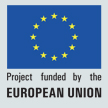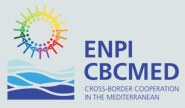Preliminary Program of SWMED project Workshop “Protection Zone” 13-14/03/2013
Presentations:
Ground and surface water in a natural drinking water resource often subjected to severe human impact.
Strategies are required to preserve optimum groundwater quality, and so management of this vital
natural resource has become worldwide priority. In the last years, the international scientific community
has shown great interest on this topic and, thus, many works focused on environmental management
for water.
Ground water from karst aquifers is among the most important resources of drinking water supply of
the worldwide population, in some country karst water contributes 50% to the total drinking water
supply, in some regions it is the only available freshwater resource. At the same time karst aquifers are
particularly vulnerable to contamination due to thin soil cover, flow concentration in the epikarst,
contaminants can easily reach the groundwater, where they may transport rapidly in karst conduits over
large distances.
These meetings will focus on studies done in West bank and other MENA region countries and exchange
expertise in the protection zone field. These areas of studes can be subdivided into four different types:
wells, springs, rivers and lakes. In these meeting we will focus on area of the populations live and they
use springs and wells –based water resources.
From these meeting we hope to develop the vulnerability map by using GIS tools to delineate protection
zone (PZ) method, Wellhead Analytic Element Model (WhAEM2000).
The land management and uses can be accepted as most critical tool for sustaining water resources.
Therefore protection zone approach together with suitable land uses can be functional for mitigating
existing vulnerabilities of water resources. Sustaining water resources contains many activities for
diverse topics. Among these issue of the protection of water quality is the most crucial one and it is
highly dependent on land management and any human activities available on the recharge area of the
water resource. This increase the risk of water resource degradation and water related hazards. On the
other hand, the vulnerability of wells, springs, rivers and lakes that are feeding from these resources,
these are highly dependent on land management. This issue has been becoming one the most
problematic issue in most of MENA region countries, hence, water resources are quite limited and affect
by the dilution of the effluents by the rainfall or in the aquifer storage is minimal and rare.
In Palestine for instance, there is no protection zone approach. In comparison with other countries there
are relatively varied in the number of protection zones, moreover, several approaches can be improved
for the MENA region countries with more contemporary methodologies for ecosystem functioning of
riparian corridors, as well as other protected areas can be supporting tools for water quality. Therefore
sharing experience among these countries appears to be an efficient approach for this project proposal.


